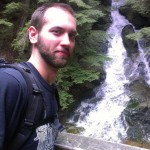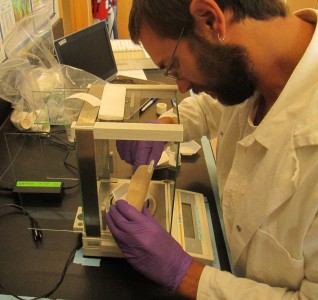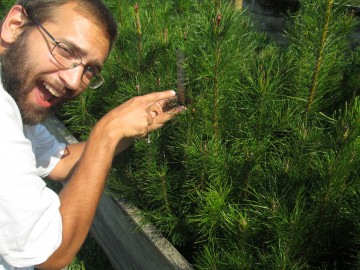 Tyler is a research assistant intern at AdapTree. He is involved in the genomics side of the project, collecting and preparing samples in the lab. He is also working on the socioeconomic side with the ultimate goal of communicating results of research to end users and stakeholders. He is excited to work with the AdapTree project because of its focus on climate change and applicability to both conservation and industry. Tyler has just finished his second year of a Natural Resource Conservation degree in the Faculty of Forestry at UBC. Outside of work and school he spends his time playing music and hiking.
Tyler is a research assistant intern at AdapTree. He is involved in the genomics side of the project, collecting and preparing samples in the lab. He is also working on the socioeconomic side with the ultimate goal of communicating results of research to end users and stakeholders. He is excited to work with the AdapTree project because of its focus on climate change and applicability to both conservation and industry. Tyler has just finished his second year of a Natural Resource Conservation degree in the Faculty of Forestry at UBC. Outside of work and school he spends his time playing music and hiking.
Tyler Dergousoff – AdapTree Research Assistant Intern from UBC UILO on Vimeo.
Can you tell us about your internship? What is your role?
I have been working with AdapTree this summer. AdapTree is a project looking at the adaptive potential of economically important tree species in the face of climate change. This project spans across disciplines including genomics, climate modelling, policy and others. My own work has been focused on communicating research to end users and the general public. We decided the best way to do this was to put together a newsletter. I have also spent time working in the lab and in the field on different parts of AdapTree to get a better understanding of the research being done. Working with both the genomics and social research sides gave me a unique view and understanding of the project. Keep an eye out on the AdapTree website and for the newsletter if you’re interested in learning more about what we’ve done!
Did this internship meet your expectations?
Definitely. This internship allowed me to get experience in a lot of different things that I am interested in, like science communication, getting a look at the research process and learning some of the nuts and bolts of genomics work. I had been interested in getting involved with AdapTree since I first heard about it in my first year at UBC. The combination of genetics, forestry, climate change and impacting policy and industry directly were all aspects that drew me to the project. This internship has allowed me to contribute to something I think is important as well as to get some excellent experience.
What are the things that you look forward to when you are heading to work every morning?
Every day is different and new things are happening all the time. There has been a combination of lab, field and office work to do, which keep things interesting. Working with knowledgeable people and being able to learn while I work, has also been great.
What are the three top skills that you acquired during your internship and that you will most likely utilize in future employment or future studies?
Communication is number one. I’ve talked to people who work in the resource industry and a problem that has come up more than once is communication difficulties between groups with different educational backgrounds. I have learned a lot this summer about not only the importance of communicating between people with different knowledge bases, but also how to actually do so effectively. I’ve improved a lot on my time management as well. There has been a lot of freedom and little micromanagement which means I was required to make and stick to long term plans and goals to be successful. Lastly, I have gotten better at working in a group setting. While many people have their own focuses, there is constant communication and organization to plan group work or to share information. To see and be part of a well-functioning group gave me some valuable experience with how to work with others in the future.
Can you tell us some interesting stories from the field?
Some of us made a trip up to UBC’s Alex Fraser research forest near Gavin Lake earlier in the summer. We were collecting needle samples from trees which were planted in a clearcut as part of a genomics experiment. We saw so much wildlife it felt like our days should have been narrated by David Attenborough. The clearcut was full of wild strawberries which attracted all sorts of animals including a bear and her three cubs. Luckily we made a lot of noise so they stayed away from us and we were prepared with bear spray just in case. We did get eaten alive by mosquitoes, black flies and horseflies though, which was slightly less exciting.
Have you gained a greater understanding of genomics?
I have learned so much this summer. One of the best things about this job has been working closely with many knowledgeable people. Before I could communicate research to the public I had to understand it myself and that involved a lot of talking to researchers. Everybody has been very helpful and willing to take time to explain what is going on. Sometimes people would go out of their way to find me so they could show me something they were working on or something interesting they were about to do in the lab! Being able to see different projects across disciplines within AdapTree gave me a better understanding of what it takes to reach ambitious goals.
If you had to give advice to other students looking for experiences outside of school, what would you say to them?
If you’re looking for work experience, don’t be afraid to just talk to your professors or people in the industry. You will be surprised how approachable people are and how much they’re willing to do for you if you simply show interest and can act professional. Also, if there is something that you think you’d like to work on when you graduate try it out now! It’s nice to have a plan for the future but it is disheartening to put so much effort to get somewhere and find out it isn’t what you thought or isn’t where you want to be. University is the best time to throw caution to the wind and try things out until you find what you really want to do.
Can you tell us three fun/interesting/random facts about yourself?
Music is pretty much my life outside of work and school. Between graduating high school and coming to UBC, I spent a few years playing in punk and metal bands in Calgary. It’s taken a bit of a back seat since coming to school but I’m still in a couple groups as well as singing in a Russian choir. I’ve been vegan for almost three years; it’s partially an ethical and partially an environmental thing to me. I also have a scar across one of my hands from a hole saw (Google it) that I got while working construction last summer. One of the bonuses about this internship is that there is a very small chance of that happening here!

